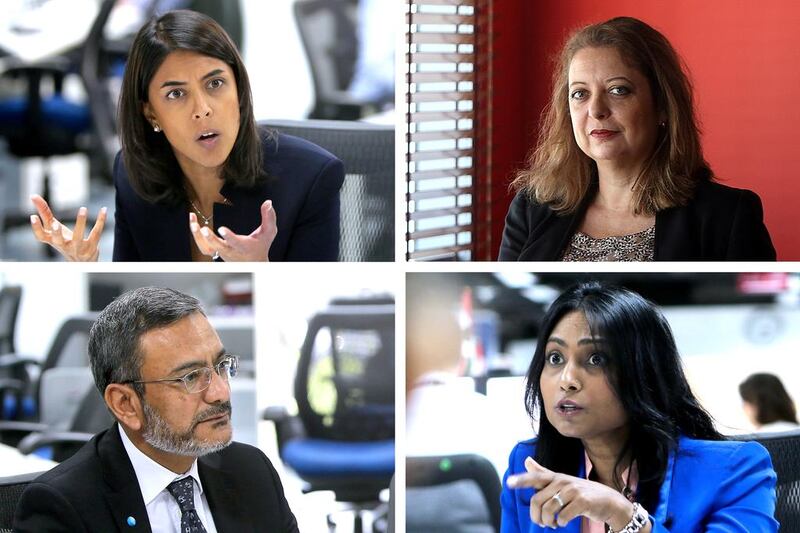I work as an optometrist in Dubai and have been struggling lately to pay off my debt. All these expenses were for medical purposes (cancer treatment) for my mother, who lives in Mumbai. I have seven credit cards, on which I owe:
1. Emirates NBD: Dh5,200
2. Citibank: Dh5,660
3. ADCB: Dh6,420
4. Mashreq: Dh9,000
5. FGB: Dh27,000
6. Rakbank: Dh19,000
7. Emirates Islamic: Dh2,700
In addition I'm paying Dh3,200 every month for a ADCB smartloan; it has an outstanding balance of Dh76,000. My salary comes to roughly Dh8,900 a month, though this can vary sometimes because of commission. How can I settle this? SM, Dubai
Debt panellist 1: Keren Bobker, The National's On Your Side columnist and an independent financial adviser
I have to ask why anyone would think that taking out seven credit cards could ever be a good idea. And why are banks giving out cards like sweets to someone who already has a number of them? I understand that there were personal expenses, but multiple cards, each probably with an annual fee, is not the way to do this.
The outstanding combined balance on the cards is Dh74,980, so total debts stand at Dh150,980, roughly 140 per cent of the total annual salary – so while the repayments will be a high percentage of salary that will in part be because of the high interest rates on the credit cards.
The first step is to stop using the credit cards. Cut up all, bar one, and put the remaining at the back of a drawer so that it is there in case of dire emergency but not to be touched for any other reason.
The interest rate on personal loans is lower than for credit cards, so in this situation it may be worth seeing if it is possible to increase the personal loan to repay a number of the cards. The loan repayments are lower than 50 per cent of income so that might be a possibility and it would reduce the overall monthly payments.
For the remaining cards, it is essential that payments are made for more than the minimum monthly payment, as otherwise that will never reduce the capital outstanding. The easiest way to repay credit cards is to attack one at the time, maintaining minimum repayments on all. Start with either the largest balance or the highest interest rate and pay more than the minimum, as much as possible. Some advocate repaying the largest debt, but I think that tackling the ones with the highest rate of interest is the most efficient way from a purely financial point of view. If you do this for a few months you will start seeing the actual balance reducing. Once one card is paid off in this way, move on to another. It is not an overnight solution, but this strategy, the “snowball method” is proven and will make a real difference.
Debts like these are rarely repaid overnight, but it is possible to repay them with the right strategy and proper diligence.
Debt panellist 2: Ambareen Musa, the founder and chief executive of Souqalmal.com
Based on the details provided, the total outstanding amount on your seven credit cards is about Dh75,000. But the alarming fact is that this amount would have increased even further by the time you see this response. What’s the reason behind this? Excessively high interest rates on credit cards averaging close to 40 per cent annually (Annual Percentage Rate).
Getting rid of this expensive credit card debt should be your top priority. A debt consolidation loan could be a solution. This would allow you to roll your existing credit card debt and personal loan into one consolidated loan. Not only will this lower your interest payments, but will also help set up a more manageable monthly repayment schedule.
But keep in mind that qualification criteria for such a loan may differ across banks. You would be required to transfer your salary to an account with the new lender, and eligibility may depend on your past repayment track record among other criteria.
If you qualify for debt consolidation, make sure you don’t run up any additional credit card debt in the future. This would defeat the purpose of consolidation completely. Since debt consolidation is a long-term commitment, make sure you follow a strict budget so you don’t falter on your repayments in the future.
In case you are not able to qualify for such a loan, look towards other channels. Can your employer offer you a few months’ salary in advance? Can a family member financially assist you, with an interest-free loan, perhaps? You can use the money to settle the outstanding amount on your credit cards, starting with the ones charging the highest interest rate.
The Debt Panel brings together four financial experts: Jamal Alvi, the chief credit officer at Abu Dhabi Islamic Bank; Ambareen Musa, the founder and chief executive of the comparison website Souqalmal.com; Rasheda Khatun Khan, a wealth and wellness planner and founder of Design Your Life; and Keren Bobker, The National's On Your Side columnist and an independent financial adviser with Holborn Assets in Dubai. Together they answer queries in a weekly online column to help readers better tackle their debts. If you have a question for the panel, write to pf@thenational.ae.
Follow The National's Business section on Twitter






